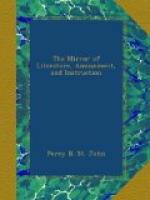* * * * *
THE WEARIED SOLDIER.
“When silent time, wi’ lightly
foot,
Had trod o’er thirty
years,
I sought again, my native land,
Wi’ many hopes and fears.”
Mrs.
Hamilton.
He came to the village, when the sun
In the “golden west”
was bright,
When sounds were dying one by one,
And the vesper star was shining
down,
With a soft and silvery light.
A war-worn wanderer was he,
And absent many a year
From the cottage-home he fain would see,
From that resting-place where
he would be,
The spot to memory dear.
It rose at last upon his view,
(Old times were thronging
round him,)
The lattice where the jasmine grew,
The meadow where he brush’d
the dew
When youth’s bright hopes were round
him.
But faces new, and sadly strange,
Were in that cottage now;
Cold eyes, that o’er his features
range,
For time had wrought a weary
change
Upon the soldier’s brow.
And some there were—the lov’d—the
dead—
Whom he no more could see,
From this cold changing world were fled,
And they had found a quiet
bed
Beneath the old yew tree.
And thither too—the wanderer
hied,
Night-dews were falling fast,
This is my “welcome home”
he cried,
And the chill breezes low
replied
In murmurs as they pass’d.
They whispering said, or seem’d
to say,
No lasting joys to earth are
given,
No longer near these ashes stray,
Go, mourner! hence, away!
away!
Thy lost ones are in heaven.
Kirton, Lindsey. Anne R.
* * * * *
RELIGIOUS FASTINGS.
From the remotest ages of antiquity most nations have practised fasting to keep the wrath of God from falling upon them for their sins. Some celebrated authors even affirm that fasting was originated by Adam after he had eaten of the forbidden fruit; but this obviously is carrying their arguments, in favour of fasting, too far, though it is as certain that the Jewish churches practised it from their first formation. The Egyptians, Phoenicians, and the Assyrians held the “solemn fast” in high favour. The Egyptians, according to Herodotus, before they offered in sacrifice the cow to Isis, to purify themselves from impurities, fasted and prayed. This custom he also ascribes to the Cyrenian women. Porphyry relates that the fasts of the Egyptians were sometimes continued for six weeks, and that the shortest ordained by their priests was seven days, during which they abstained from nearly all kinds of food. These rites they communicated to the Greeks, who observed these fasts more strictly, and with more outward show and solemnity. The Athenians likewise observed




